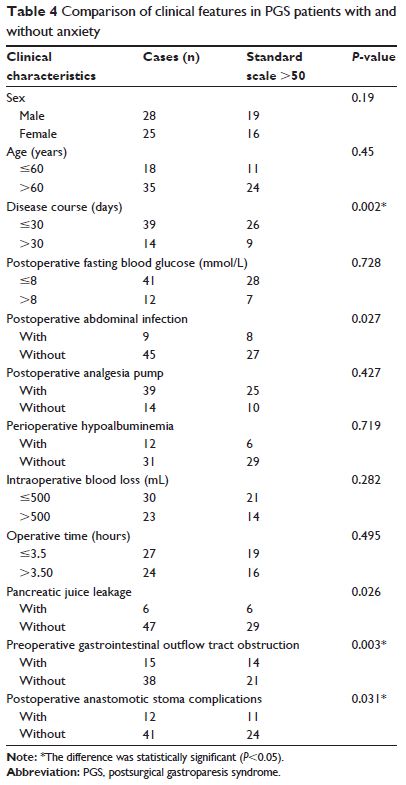108985
论文已发表
注册即可获取德孚的最新动态
IF 收录期刊
- 3.4 Breast Cancer (Dove Med Press)
- 3.2 Clin Epidemiol
- 2.6 Cancer Manag Res
- 2.9 Infect Drug Resist
- 3.7 Clin Interv Aging
- 5.1 Drug Des Dev Ther
- 3.1 Int J Chronic Obstr
- 6.6 Int J Nanomed
- 2.6 Int J Women's Health
- 2.9 Neuropsych Dis Treat
- 2.8 OncoTargets Ther
- 2.0 Patient Prefer Adher
- 2.2 Ther Clin Risk Manag
- 2.5 J Pain Res
- 3.0 Diabet Metab Synd Ob
- 3.2 Psychol Res Behav Ma
- 3.4 Nat Sci Sleep
- 1.8 Pharmgenomics Pers Med
- 2.0 Risk Manag Healthc Policy
- 4.1 J Inflamm Res
- 2.0 Int J Gen Med
- 3.4 J Hepatocell Carcinoma
- 3.0 J Asthma Allergy
- 2.2 Clin Cosmet Investig Dermatol
- 2.4 J Multidiscip Healthc

术后胃轻瘫综合征患者抑郁和焦虑的量化评估
Authors Zheng LJ, Ma JC, Fang D, Wu LG, Gong ZQ, Qi JB, Zhao XD, Du JB, Ma PL
Received 27 October 2017
Accepted for publication 2 February 2018
Published 15 March 2018 Volume 2018:14 Pages 551—556
DOI https://doi.org/10.2147/TCRM.S155358
Checked for plagiarism Yes
Review by Single-blind
Peer reviewers approved by Dr Hoa Le
Peer reviewer comments 2
Editor who approved publication: Professor Deyun Wang
Background: This
study aimed to analyze the stage-situation depression and anxiety as well as
independent influential factors in patients with postsurgical gastroparesis
syndrome (PGS)and to provide dependent indications for treatment.
Patients and methods: The
self-rating depression scale (SDS) and self-rating anxiety scale (SAS) were
used to test the depression and anxiety of 53 patients with PGS, who were
treated in the Department of Gastroenterological Surgery of Gansu Provincial
Hospital from January 2012 to October 2016. A comparison between the SDS or SAS
scores of patients with PGS and without PGS was undertaken; then, we
retrospectively analyzed the factors influencing depression and anxiety in PGS patients.
Results: The
patients with PGS’ mean scores of depression and anxiety were 49.92±11.37 and
50.91±6.57, respectively, which were higher than that of patients without PGS
in the Chinese population (P <0.05). The results of multivariate logistic regression
analysis indicated that the independent influential factors of depression and
anxiety in patients with PGS included course of disease, pancreatic juice
leakage, preoperative outflow tract obstruction, postoperative abdominal
infection, and anastomotic complication (P <0.05). Patients with a disease course longer than
30 days; with pancreatic juice leakage; and who suffered from preoperative
outflow tract obstruction, postoperative abdominal infection, and anastomotic
complication had higher ratios of depression and anxiety.
Conclusion: Depression
and anxiety are clearly evident in patients with PGS, and we should pay
attention to this phenomenon and provide appropriate treatment.
Keywords: postoperative
gastroparesis syndrome, depression, anxiety, influential factors
